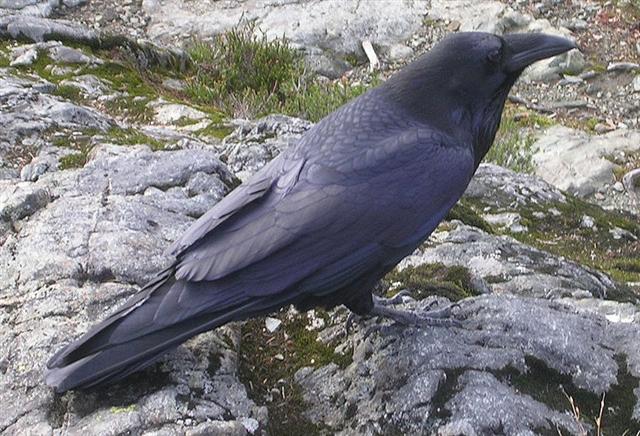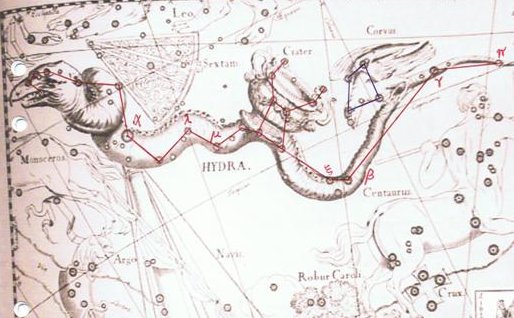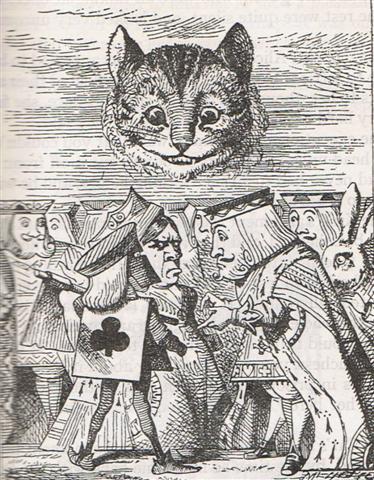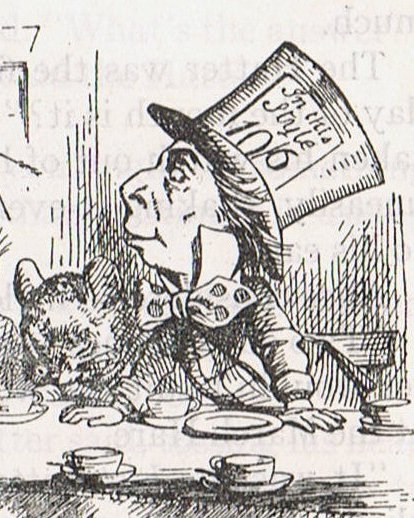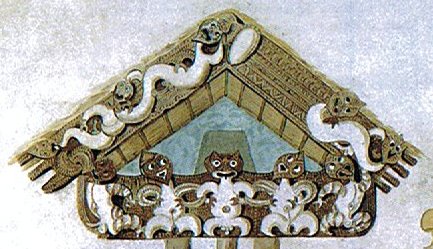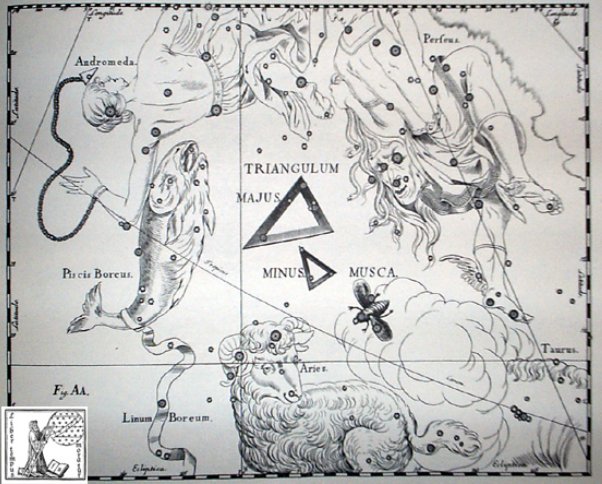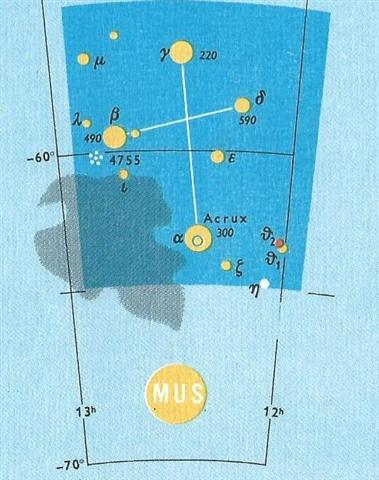The idea of an 'upside down mouth' after the spring Sun had turned around - no longer was rising but descending during his long after-noon - seems to be expressed in the eye-catching Bab9-29:
Here the perspective with a pair of 'eyes' to the right of the 'open mouth' (vaha kai) could have been intended to illustrate how the sad mouth of the setting Sun (Set) is at left because precession had pushed the stars ahead in the Sun calendar with about a quarter as counted from the ancient position of high summer. The 'thirsty Raven' (Corvus) was now at autumn equinox instead of standing at the June solstice.
... the bird, being sent with a cup for water, loitered at a fig-tree till the fruit became ripe, and then returned to the god with a water-snake in his claws and a lie in his mouth, alleging the snake to have been the cause of the delay. In punishment he was forever fixed in the sky with the Cup and the Snake; and, we may infer, doomed to everlasting thirst by the guardianship of the Hydra over the Cup and its contents. From all this came other poetical names for our Corvus - Avis Ficarius, the Fig Bird; and Emansor, one who stays beyond his time; and a belief, in early folk-lore, that this alone among birds did not carry water to its young ... In the Flag of Brazil the star at the opposite side (compared to Spica) of the broad band is γ Hydrae:
The a.m. king had a sad face, because he was doomed to be beheaded:
And an empty lifeless long sand-bank (ζ Corvi,*186) stretching to September 23, 266) would then follow. 7 (septem) * 23 = 161 → June 10 (10 / 6). ... The seventh tree is the oak, the tree of Zeus, Juppiter, Hercules, The Dagda (the chief of the elder Irish gods), Thor, and all the other Thundergods, Jehovah in so far as he was 'El', and Allah. The royalty of the oak-tree needs no enlarging upon: most people are familiar with the argument of Sir James Frazer's Golden Bough, which concerns the human sacrifice of the oak-king of Nemi on Midsummer Day. The fuel of the midsummer fires is always oak, the fire of Vesta at Rome was fed with oak, and the need-fire is always kindled in an oak-log. When Gwion writes in the Câd Goddeu, 'Stout Guardian of the door, His name in every tongue', he is saying that doors are customarily made of oak as the strongest and toughest wood and that 'Duir', the Beth-Luis-Nion name for 'Oak', means 'door' in many European languages including Old Goidelic dorus, Latin foris, Greek thura, and German tür, all derived from the Sanskrit Dwr, and that Daleth, the Hebrew letter D, means 'Door' - the 'l' being originally an 'r'. Midsummer is the flowering season of the oak, which is the tree of endurance and triumph, and like the ash is said to 'court the lightning flash'. Its roots are believed to extend as deep underground as its branches rise in the air - Virgil mentions this - which makes it emblematic of a god whose law runs both in Heaven and in the Underworld ... The month, which takes its name from Juppiter the oak-god, begins on June 10th and ends of July 7th. Midway comes St. John's Day, June 24th, the day on which the oak-king was sacrificially burned alive. The Celtic year was divided into two halves with the second half beginning in July, apparently after a seven-day wake, or funeral feast, in the oak-king's honour ...
... It will be objected that man has as valid a claim to divinity as woman. That is true only in a sense; he is divine not in his single person, but only in his twinhood. As Osiris, the Spirit of the Waxing Year, he is always jealous of his weird, Set, the Spirit of the Waning Year, and vice versa; he cannot be both of them at once except by an intellectual effort that destroys his humanity, and this is the fundamental defect of the Apollonian or Jehovistic cult. Man is demi-god: he always has either one foot or the other in the grave; woman is divine because she can keep both her feet always in the same place, whether in the sky, in the underworld, or on this earth. Man envies her and tells himself lies about his own completeness, and thereby makes himself miserable; because if he is divine she is not even a demi-goddess - she is a mere nymph and his love for her turns to scorn or hate. Woman worships the male infant, not the grown man: it is evidence of her deity, of man's dependence on her for life. She is passionately interested in grown men, however, because the love-hate that Osiris and Set feel for each other on her account is a tribute to her divinity. She tries to satisfy both, but can only do so by alternate murder, and man tries to regard this as evidence of her fundamental falsity, not of his own irreconsolable demands on her ... 92 * 9 = 828 = 2 * 414, is a result which suggests the opposite of 414 (41.4) at the fruitful orifice of Bharani (the Bearer). ... From a religious point of view, the high regard for flies, whose increase or reduction causes a similar increase or reduction in the size of the human population, is interesting, even more so because swarms of flies are often a real nuisance on Easter Island, something most visitors have commented on in vivid language. The explanation seems to be that there is a parallel relationship between flies and human souls, in this case, the souls of the unborn. There is a widespread belief throughout Polynesia that insects are the embodiment of numinous beings, such as gods or the spirits of the dead, and this concept extends into Southeast Asia, where insects are seen as the embodiment of the soul ...
369 - 183 = 186. Here was indeed the Long Sand-bank - although not at the Sun but at the Full Moon:
|
|||||||||||||||||||||||||||||||||||||||||||||||||||||||||||||||||||||||||||||||||||||||||||||||||||||||||||||||||||||||||||||||||||||||||||||||||||||||||||||||||||||||||||||||||||||||||||||||||||||||||||||||||||||||||||||||||||||




